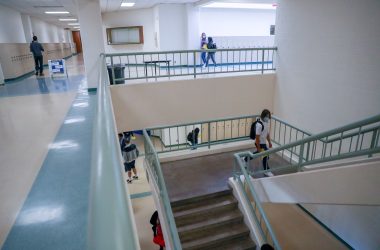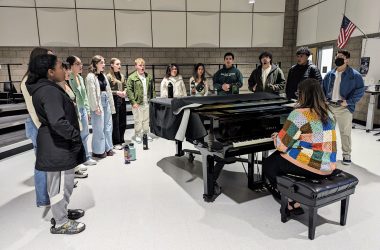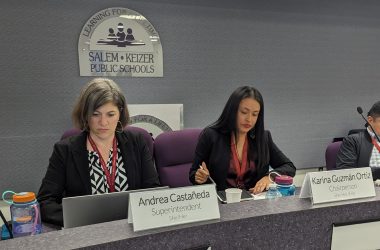
Vinny Olivas, center, protests outside a Salem-Keizer School District building with other members of Latinos Unidos Siempre after walking out of a student task force meeting on Sept. 25 (Rachel Alexander/Salem Reporter)
Three months have passed since Christy Perry, superintendent of the Salem-Keizer School District, pledged to reassess the use of police in local schools and conflict is now unfolding on a student task force Perry created to recommend a path forward.
Three high school students with Latinos Unidos Siempre, part of the 16-member student task force, said they feel the process is taking too long, wrapping in issues unrelated to the presence of police in schools and failing to give enough attention to students involved in the criminal justice system.
“This ties into years of us being ignored,” said Alex Sosa Navarro, 15, a Latinos Unidos Siempre student who attends North Salem High School.
Sosa Navarro spoke following a contentious task force meeting last week where he and two other Latinos Unidos Siempre students walked out after declining to sign a confidentiality agreement the other students in the group agreed to unanimously.
The student task force, formed in early July, is expected to recommend whether police should remain in Salem-Keizer schools, how the district should spend money on student safety, and other policies and practices that would improve student safety, especially for students of color, according to a document outlining the process. The group includes Black, Native American, Pacific Islander, Latino and Asian students, with representatives from most district high schools.
Perry will take the group’s recommendations to the school board.
Latinos Unidos Siempre students and leaders say their issue is with Perry and other district administrators, not the other students on the task force.
But in a statement to Salem Reporter, the remaining members of the student task force said they’ve been frustrated by Latinos Unidos Siempre taking to social media to air grievances about the process while meetings are ongoing, despite a group agreement from the start to keep meetings confidential.
They said the process is “completely student-led,” with students deciding which adults they want to hear from, and said the confidentiality agreements are in place so students feel comfortable speaking honestly about their experiences without fear of retaliation.
The students have met weekly over the past month to talk to everyone from Salem Police Chief Jerry Moore to school counselors. They expect to draft their recommendations over the next two weeks.
Vinny Olivas, 16, another Latinos Unidos Siempre student and task force member, said he’s the only member of the group currently on court probation and one of just a few who have had personal experience with the criminal justice system, based on task force conversations over the summer.
He said his opinion that police do not belong in schools, which is based on his own experience being racially profiled by those officers, has been dismissed by other students and adults in the room as a refusal to be open-minded.
“This is a way for Christy Perry to block out four years of my experience,” he said after leaving last week’s meeting. He and other Latinos Unidos Siempre students took issue with being asked to sign a confidentiality agreement, which they felt was retaliation from district administrators for raising concerns about the task force outside the group.
In their statement, other task force members said Olivas’ experience was valuable, and that Latinos Unidos Siempre students are not the only ones in the group who have been arrested or had negative experiences with police in schools. But they said they expected all students to be open to experiences that differed from their own, and said students involved in the criminal justice system aren’t the only perspectives they need to consider.
“If we had all students who had been in the criminal justice system that means that we will have perspectives missing in the discussion,” the students said in their statement. They added that getting students to open up about personal or traumatic experiences in a group setting has been challenging for some who fear the information will be shared outside the group.
The written confidentiality agreement was intended to put in writing verbal agreements students had from the start of the meetings, and came because of Latinos Unidos Siempre sharing information publicly about the process they didn’t feel was fair or accurate, they said.
The fight over police in schools and their impact on students of color has a decades-long history in Salem-Keizer.
Latinos Unidos Siempre was founded in the 1990s as Salem’s Latino population soared following an influx of families moving from California. Their goal was to create community for Latino teens and advocate against immigration raids and school policies that stereotyped Latino teens as gang members.
For the past four years, students and staff from Latinos Unidos Siempre have regularly attended Salem-Keizer School Board meetings to speak about the school-to-prison pipeline. That is a term advocates use to describe a system where students of color are more likely to be suspended, expelled and then referred to law enforcement than their white peers.
Their protests have gained little traction until this summer, when Minneapolis police killed George Floyd and ignited a wave of racial justice protests across the U.S.
Latinos Unidos Siempre pushed the school district to end its contracts with local law enforcement agencies, drawing hundreds of public comments in support at a June school board meeting, with a handful of community members opposing.
That discussion ultimately led to a public conflict between Perry and the school board, during which Perry said board members were discounting the experience of students of color and failing to prioritize equity in their decisions.
She said the district would discuss the issue with affected groups and recommend a path forward to the board. Subsequently, Moore said the Salem Police Department would suspend the program for one year to reevaluate it. The pause comes as district students are attending school online through at least early November.
District administrators decided “we really need to hear from students and we need to have students weigh in on this,” said assistant superintendent Iton Udosenata.
They formed the task force in July after conversations with Latinos Unidos Siempre, he said, and asked other district employees who work closely with students of color to seek out students to participate.
Udosenata said the group includes several students who have been expelled. He said finding students willing to participate over the summer was a challenge and acknowledged a group with more members who have personal experience with school discipline and arrest would be beneficial.
But he said it’s also important not to assume a student of color isn’t impacted by disproportionate discipline and arrest rates, even if they haven’t personally been expelled or interacted with police.
“Even if only four out of 12 kids raise their hand, that does not mean that the other students don’t get nervous when they see a police officer behind them or contemplate whether they’ll be treated unfairly. It does not mean they haven’t somehow been traumatized by the experiences of their peers,” he said.
Olivas and Sosa Navarro said after years of advocating for a change and getting closer than they ever have to removing police from schools, it’s been frustrating to spend time rehashing topics they understand well through their own experiences, like the school to prison pipeline.
They joined other Latinos Unidos Siempre members in protesting outside a district office last week after leaving the task force meeting, holding signs calling for “No Cops in SKPS,” chalking the sidewalk and banging on the building windows.
The group said their protest was directed at Perry and the district administration, not fellow students. Signs referred to Perry by name, though she was not at the meeting, and called on the district to end police contracts.
Remaining student task force members said in their statement they felt “unsafe” as Latinos Unidos Siempre members banged on windows while they were meeting inside. They said they’re committed to seeing the process through, but fear Latinos Unidos Siempre will harass them online for their work on the task force.
That’s something the group has no intention of doing, director Sandra Hernández-Lomelí said. She reiterated their issue is with Perry and other district administrators.
Latinos Unidos Siempre is organizing a march Friday from the district office to the Marion County Juvenile Department to repeat their demand that the district end police contracts.
Udosenata said Latinos Unidos Siempre student members are still welcome at the task force if they’re willing to agree to the confidentiality provisions requested by the other students.
He said he understands their frustration about time the process is taking, but said it’s close to a resolution.
“We’re going to arrive at a decision very soon and we have no intention to delay this process,” he said.
PRIOR COVERAGE
Hundreds call on Salem-Keizer to end contracts for police in schools
For 50 years, police have patrolled schools in Salem. Now, some say it’s time for a new approach.
SUPPORT ESSENTIAL REPORTING FOR SALEM – A subscription starts at $5 a month for around-the-clock access to stories and email alerts sent directly to you. Your support matters. Go HERE.
Contact reporter Rachel Alexander: [email protected] or 503-575-1241.

Rachel Alexander is Salem Reporter’s managing editor. She joined Salem Reporter when it was founded in 2018 and covers city news, education, nonprofits and a little bit of everything else. She’s been a journalist in Oregon and Washington for a decade. Outside of work, she’s a skater and board member with Salem’s Cherry City Roller Derby and can often be found with her nose buried in a book.









